#ancient epic
Text

The Song of Roland. A French epic telling the tale of Roland's last stand. The Battle of Roncevaux Pass occured on August 15, 778, and saw a large force of Basques ambush a part of Charlemagne's army in Roncevaux Pass, a mountain pass in the Pyrenees on the modern-day border between France and Spain, after Charlemagne's invasion of the Iberian Peninsula. Roland, a Frankish military leader under Charlemagne, and his rearguard were slain in this battle.
#history#art#artwork#songofroland#epic#great epic#frenchepic#ancient epic#world history#the crusades#charlemagne#Roland
3 notes
·
View notes
Text
Unveiling the Epic Grandeur: A Review of "The Iliad" translated by Rev. W. Lucas Collins M.A.

Homer's "The Iliad," translated by Rev. W. Lucas Collins M.A., stands as a timeless testament to the enduring power of storytelling and the human spirit. This monumental epic transports readers to the heart of the Trojan War, an ancient conflict between the Greeks and the Trojans, immortalizing the heroism, tragedy, and complex emotions of its characters. Collins' translation captures the essence of Homer's original work, maintaining the poetic rhythm and majestic language that have mesmerized readers for centuries.
At the core of "The Iliad" lies the figure of Achilles, the greatest warrior of the Greek army, whose wrath and pride drive the narrative forward. Through Collins' translation, Achilles' internal struggles and external feats are rendered with vivid clarity, showcasing the character's depth and complexity. The themes of honor, glory, and the fragility of human life reverberate throughout the text, inviting readers to ponder the nature of heroism and the consequences of unchecked ambition.
One of the most striking aspects of Collins' translation is its ability to capture the sheer scale of the Trojan War. From the clash of bronze-clad warriors on the battlefield to the whispered intrigues of the gods on Mount Olympus, the epic sweeps across vast landscapes and cosmic realms with breathtaking intensity. Collins' evocative language brings to life the sights, sounds, and emotions of ancient warfare, immersing readers in a world where every action carries profound significance.
Moreover, Collins' translation does justice to Homer's rich tapestry of characters, each imbued with their own motivations, flaws, and desires. Whether it's the noble Hector, the doomed Priam, or the cunning Odysseus, every figure in "The Iliad" comes alive on the page, leaving an indelible impression on the reader's mind. Through Collins' masterful rendition, these characters cease to be mere names from antiquity and instead become timeless symbols of human experience.
Beyond its gripping narrative and compelling characters, "The Iliad" offers profound insights into the human condition and the nature of war. Through the lens of ancient myth, Homer explores themes of mortality, fate, and the capriciousness of the gods, prompting readers to confront fundamental questions about life, death, and the pursuit of meaning. Collins' translation preserves the philosophical depth of Homer's work, inviting readers to embark on a journey of intellectual and emotional discovery.
In conclusion, "The Iliad" translated by Rev. W. Lucas Collins M.A. is a masterpiece of world literature that continues to captivate and inspire readers across generations. With its timeless themes, epic scope, and poetic beauty, this translation serves as a fitting tribute to Homer's enduring legacy, ensuring that the tale of Achilles and the Trojan War will continue to resonate with audiences for centuries to come.
Homer's "The Iliad," translated by Rev. W. Lucas Collins M.A. is available in Amazon in paperback 12.99$ and hardcover 19.99$ editions.
Number of pages: 208
Language: English
Rating: 10/10
Link of the book!
Review By: King's Cat
#The Iliad#Homer#Ancient epic#Trojan War#Greek mythology#Rev. W. Lucas Collins M.A.#Translation#Epic poetry#Achilles#Hector#Gods and goddesses#Heroism#Wrath#Pride#Honor#Glory#Fate#Mortality#War#Battle#Troy#Olympus#Immortals#Greek heroes#Tragedy#Characterization#Epic similes#Themes#Sacrifice#Courage
1 note
·
View note
Text
Unveiling the Epic Grandeur: A Review of "The Iliad" translated by Rev. W. Lucas Collins M.A.

Homer's "The Iliad," translated by Rev. W. Lucas Collins M.A., stands as a timeless testament to the enduring power of storytelling and the human spirit. This monumental epic transports readers to the heart of the Trojan War, an ancient conflict between the Greeks and the Trojans, immortalizing the heroism, tragedy, and complex emotions of its characters. Collins' translation captures the essence of Homer's original work, maintaining the poetic rhythm and majestic language that have mesmerized readers for centuries.
At the core of "The Iliad" lies the figure of Achilles, the greatest warrior of the Greek army, whose wrath and pride drive the narrative forward. Through Collins' translation, Achilles' internal struggles and external feats are rendered with vivid clarity, showcasing the character's depth and complexity. The themes of honor, glory, and the fragility of human life reverberate throughout the text, inviting readers to ponder the nature of heroism and the consequences of unchecked ambition.
One of the most striking aspects of Collins' translation is its ability to capture the sheer scale of the Trojan War. From the clash of bronze-clad warriors on the battlefield to the whispered intrigues of the gods on Mount Olympus, the epic sweeps across vast landscapes and cosmic realms with breathtaking intensity. Collins' evocative language brings to life the sights, sounds, and emotions of ancient warfare, immersing readers in a world where every action carries profound significance.
Moreover, Collins' translation does justice to Homer's rich tapestry of characters, each imbued with their own motivations, flaws, and desires. Whether it's the noble Hector, the doomed Priam, or the cunning Odysseus, every figure in "The Iliad" comes alive on the page, leaving an indelible impression on the reader's mind. Through Collins' masterful rendition, these characters cease to be mere names from antiquity and instead become timeless symbols of human experience.
Beyond its gripping narrative and compelling characters, "The Iliad" offers profound insights into the human condition and the nature of war. Through the lens of ancient myth, Homer explores themes of mortality, fate, and the capriciousness of the gods, prompting readers to confront fundamental questions about life, death, and the pursuit of meaning. Collins' translation preserves the philosophical depth of Homer's work, inviting readers to embark on a journey of intellectual and emotional discovery.
In conclusion, "The Iliad" translated by Rev. W. Lucas Collins M.A. is a masterpiece of world literature that continues to captivate and inspire readers across generations. With its timeless themes, epic scope, and poetic beauty, this translation serves as a fitting tribute to Homer's enduring legacy, ensuring that the tale of Achilles and the Trojan War will continue to resonate with audiences for centuries to come.
Homer's "The Iliad," translated by Rev. W. Lucas Collins M.A. is available in Amazon in paperback 12.99$ and hardcover 19.99$ editions.
Number of pages: 208
Language: English
Rating: 10/10
Link of the book!
Review By: King's Cat
#The Iliad#Homer#Ancient epic#Trojan War#Greek mythology#Rev. W. Lucas Collins M.A.#Translation#Epic poetry#Achilles#Hector#Gods and goddesses#Heroism#Wrath#Pride#Honor#Glory#Fate#Mortality#War#Battle#Troy#Olympus#Immortals#Greek heroes#Tragedy#Characterization#Epic similes#Themes#Sacrifice#Courage
1 note
·
View note
Text
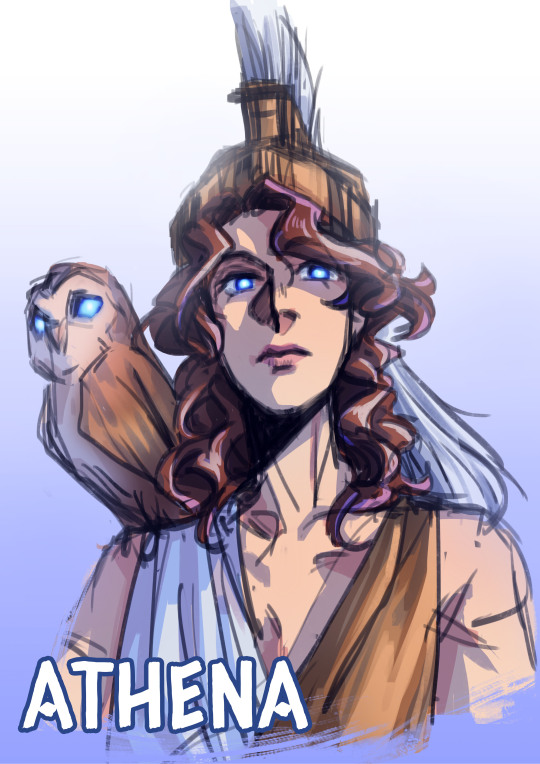
Goddess of wisdom
#art#my art#digital art#digital drawing#artwork#fan art#greek mythology#digital#greek goddess#goddess#goddess of wisdom#athena#greek myths#greek myth#ancient greek mythology#ancient greece#epic the musical fanart#epic: the musical#epic the musical#tagamemnon
2K notes
·
View notes
Text
okay so I was doing a Research™️ about ancient Greek etymology as one does and I found some Things that made me want to Violently Claw My Arms Off please allow me to force feed you my discoveries
So there are 2 words for "not" in ancient Greek, depending on the context: ou and mē. Having introduced himself in the Cyclops episode as " ou tis", or No-man, he then stabs Polyphemus in the eye. When Polyphemus' brothers come to check on him, they say this:
"... surely no man [mē tis] is carrying off your sheep? Surely no man [mē tis] is trying to kill you either by fraud or by force?"
Right after this, after the other cyclopes ditch Polyphemus, Odysseus's inner monologue goes something like this:
"Then they went away, and I laughed inwardly at the success of my clever strategem [metis]." (pronounced mEH-Tis)
Now, there's a difference between mē tis and metis. [mē tis] (pronounced mEH-Tis with a space between the syllables) is the literal translation for "no man". Metis is a word for extreme intelligence/cunning, which is something Odysseus is famous for.
Now, there are several examples of abuse of metis/intelligence in the Odyssey, but I think the juxtaposition between [mē tis], or the concept of anonymity, and metis, or extreme intelligence, is REALLY interesting. Odysseus's adoption of the title "No-man" was characteristic of metis--it was a really smart move that simultaneously hid him from the cyclops and avoided any future consequences. It was a highly effective strategy all wrapped up in a nest little package with a bow on it.
But when he revealed himself as Odysseus of Ithaca, effectively throwing off No-man (anonymity and [mē tis]), that was characterized as idiocy--he's essentially doxxed himself, and now he's doing to (spoiler alert) get tossed around the Mediterranean by Poseidon for the next 10 years.
This is really interesting because it lets you see the parallels/codependency between metis(intelligence) and humility. When Odysseus refused to allow himself to go unnoticed (hubris) he suffered for it. BUT when he declined instant glory/satisfaction (kleos) in order to achieve the long term goal of survival, he was rewarded with Athena's favor (pay attention. This part is important).
And this situation repeats itself MULTIPLE TIMES in the Odyssey--the EXACT SAME THING happens near the end of the book, with the suitors. When. Odysseus is dressed as a beggar and the suitors/Antinious are abusing him, he ACTIVELY CHOOSES not to react--he doesn't stand up and rip off his disguise and start hollering "TIS I, ODYSSEUS OF ITHACA! FEAR MY WRATH"
No. He sits there patiently and waits. He plans and schemes and quietly orchestrates their downfall without alerting them of it. Why? Because he learned his lesson the first time this happened. He buried his rage and adopted what was, according to Grace LA Franz, a more feminine form of metis, weaving a web of destruction for his enemies that ultimately resulted in their total annihilation (see Weaving a Way to Nostos: Odysseus and Feminine Metis in the Odyssey by Grace LaFranz). His patience allowed him to win the whole prize--no questions asked, no 10-year-long-business-trip strings attached--just the sweetness of a full victory. And he is, once again, rewarded with Athena's favor--both in the battle with the suitors and in the aftermath (cleanup/reuniting with Penelope).
This really reinforces the idea in the Odyssey that Odysseus's defining characteristic is not just his intelligence--it's his ability to learn from his mistakes. He used what he learned at the Lotus Eaters Island against Polyphemus--the Lotus Eaters drugged his men, so he drugged Polyphemus. He used what he learned from Circe and Polyphemus against the suitors--Circe used false sweetness and honeyed words to lure his men into a trap, so that's exactly what he did to the suitors. His hubris on Polyphemus' island cost his whole crew their lives, so he intentionally left well enough alone until the right time. He didn't just learn from his failures--he turned them into BATTLE STRATEGY.
i don't care what anyone says that is completely totally and objectively awesome
#Odysseus is a certified baddie 112% of the time#he's literally the coolest you can't convince me otherwise#there's a reason that literally everyone has a crush on him#even the lesbians#its the wordplay. his words#read me a poem in iambic pentameter you bloody stinky man#literally everyone: his sad wet vibes and dark undereye circles have captivated me entirely#odysseus#the odyssey#tagamemnon#odysseus x penelope#telemachus#epic the musical#the cyclops saga#odysseus of ithaca#poseidon#etymology#ancient greece#ancient history
2K notes
·
View notes
Text

i don’t know why odysseus was so scared of a bunch of women, what an incel (circes island)
#calculating how much a post is going to bomb on the “effort put in” to “attention gained” inverse ratio#no but genuinley i love my art rn i’m in my moment#ancient greek#greek mythology#minoan#mycenaean#digital art#digital painting#circe#epic the circe saga#circes island#fanart#tsoa#odessey
758 notes
·
View notes
Text
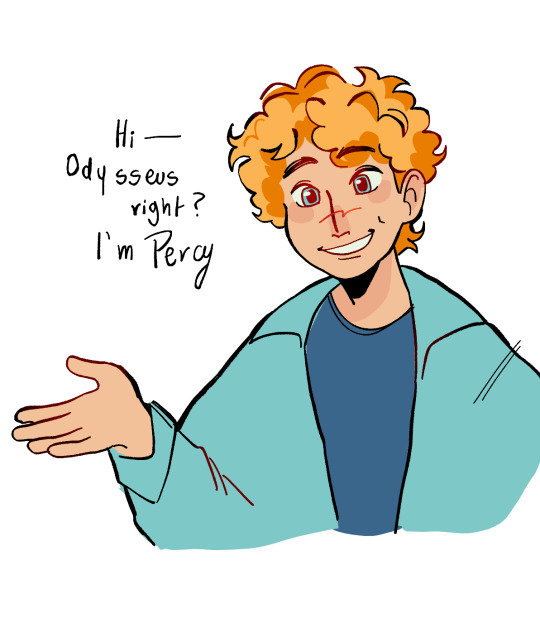

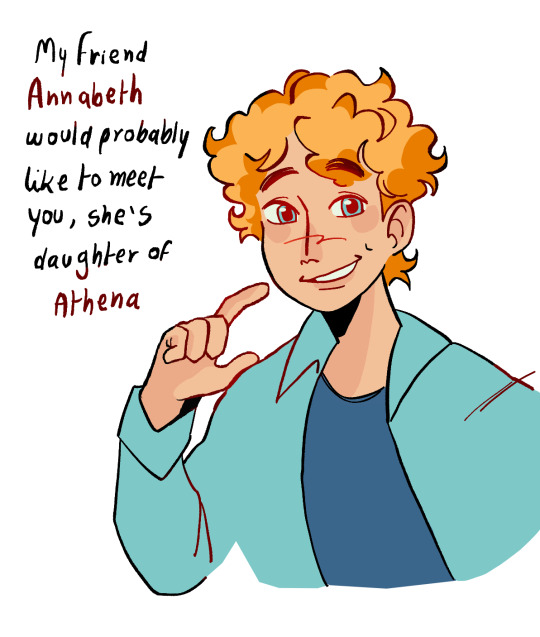




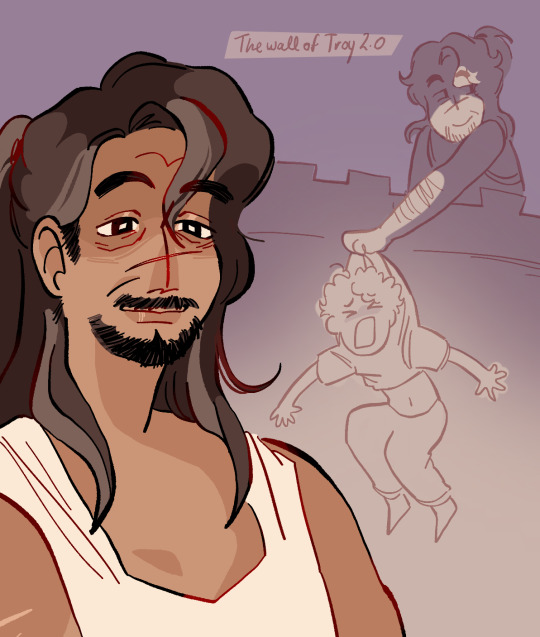
there's an artist on tiktok @/Pillow-Arty that drew art of percy jackson from the show meeting poseidon from the epic musical! i thought it was a super cool idea, so it got my brain thinking about percy meeting odysseus from epic!
odysseus' design is from @/wolfythewitch.
(i forget if tumblr blows up notifications when you tag people so just to be safe)
long story short. odysseus would probably get over it and not throw percy. but the thought is there.
#art#epic the musical#percy jackson#percy jackon and the olympians#this took a lot longer than it should have#my hand cannot draw for 5 hours straight anymore im aging i feel ancient
880 notes
·
View notes
Text
I will never understand how Odysseus has all the braincells while also having none of them at the same exact time. He is an amazing war general and is insanely smart but has the attention span of a rat fuelled by the need to cause chaos simply because he is bored. He can't listen to one thing while getting distracted by the thing he was specifically told not to touch.
#this man will forever be an enigma#odysseus#the odyssey#homer's odyssey#the iliad#homer's iliad#ancient greek mythology#greek mythology#ancient greek#greek myth#greek mythology memes#greek myth memes#greek heroes#greek stuff#greek posts#greek blog#epic the musical#epic: the musical#epic the troy saga#epic: the troy saga#epic the cyclops saga#epic: the cyclops saga#epic the ocean saga#epic saga
2K notes
·
View notes
Text
Here's something funny that I can't believe I've never shared before.
So I was scrolling through the Hector of Troy tag and I stumbled upon a post referring to him as the "son of Troy".
Now, in it of itself that's all fine and dandy, but it reminded me of something.
In Italian, the city of Troy is referred to as Troia.
The word Troia just so happens to be a mixture of the words bitch and slut.
So yeah, you just end up with these marvelous expressions:
"Hector, son of Troy" becomes "Ettore, figlio di Troia" = "Hector, son of a Bitch"
"Trojan War" becomes "Guerra di Troia" = "Slut War"
"Paris, prince of the city of Troy" becomes "Paride, principe della città di Troia" = "Paris, prince of the city of the Slut"
And I could go on.
Man, do I love my language.
#trojan war#the iliad#epic cycle#greek mythology#ancient greek mythology#hector of troy#paris of troy#tagamemnon
2K notes
·
View notes
Text
I'm seeing everyone pointing out the possible issues with Epic the Musical's deviation from the original story of Circe and Odysseus, and as someone who's studied Ancient Greece/ancient Greek myths a bit, I wanted to say some stuff about it. This will be a bit of a long one, so apologies for my rambling!
Note that I'm not trying to shit on SA survivor's perspectives and (completely valid) arguments. I'm just trying to offer some context surrounding the original myth and how it fits (or rather, doesn't fit) with a modern audience. If I'm wrong with any of this, feel free to call me out! Criticize the shit out of me! I like learning about Greek culture and myths and would 100% love to hear other perspectives on this.
So, a few points about Ancient Greek myths to kind of explain the context around Circe and Odysseus:
Greek myths generally did not have good views/depictions of women. Women were almost always depicted as conniving, selfish, sexually insatiable creatures. To largely summarize the process within actual Greek society, women had three/four stages in their life: child, dangerous/wild virgin (after first menstruation), married woman (whose wildness was tamed by her husband), and then a "real" woman (a mother). There are a few deviations from the "evil" trope, the most prominent of which being Penelope herself—she's basically the ideal Greek wife, staying loyal to her husband for 20 years and all that.
Adultery only applied to women. Husbands cheating on their wives wasn't merely tolerated, but expected. Marital sex wasn't seen as enjoyable, rather something that had to be done for the sake of reproduction and continuing the bloodline/securing inheritance. Men cheated on their wives with various kinds of prostitutes, concubines, mistresses, etc, but sleeping with unmarried women (that weren't specifically prostitutes) or married women was looked down upon. Women didn't have this same standard. They could only sleep with their husbands, hell, their husbands were pretty much the only men they could even interact with (excluding family, obviously).
The original myth has Hermes very plainly lay out how Odysseus' confrontation with Circe will go: Odysseus will eat the moly, draw his sword at her, she'll proposition him, and Hermes directly tells Odysseus to accept. Basically a "sleep with her if you want your men to live" situation. (See this post for more specifics on this).
So, let's apply this to Epic: The Musical. Here's some reasons I think may explain the Circe myth being changed:
The Greek "women being evil" stereotype is... problematic. While I 100% understand that it's important to acknowledge male victims of SA, I don't think the original myth was focusing on Odysseus being a victim—I saw it more of an emphasis on Circe being a sexually selfish woman, as all Greek women were believed to be. Changing Circe to be less conniving and evil deviates from the concerning Greek stereotype.
The SA in the myth is not actually very clearly SA. Yes, with a modern perspective, it absolutely is sexual coercion, but for Greeks, not so much. It made sense to them that sex could be transactional. It's already been established that Epic, while still generally accurate to the original myth, does change things relating to morality/themes in order to better align with modern Western ideas (i.e. OG Odysseus not being as remorseful and merciful, as that was expected of a Greek hero, but Epic Odysseus having more empathy because that's more modernly heroic). If something from the original myth doesn't translate well into modern culture, then it's understandable to want to change or omit it.
In the case that the original Circe myth wasn't SA (I'm not saying one is more right than the other, I'm just covering all the bases), then it wouldn't even constitute as cheating. Like I described earlier, it was perfectly acceptable and expected for men to sleep with women that weren't their wives. Plus, being a goddess, she's already kinda exempt from being blamed if Odysseus slept with her—only women are ever really blamed for sleeping with (or being SAed by) gods, and even then, their husbands sometimes don't even give a shit. But modernly, we would not see it that way. To us, it's not societally acceptable for a married man to sleep with another woman (without his wife's consent, at least). While Ancient Greeks viewed Odysseus as a good (or at least okay) husband, a modern audience wouldn't. Making Odysseus loyal to Penelope and not sleeping with other women (assuming this wasn't SA, but again that's one interpretation) makes him the good, loyal, empathic, modernly heroic man that Epic is clearly aiming for. Repeating my last point: If something from the original myth doesn't translate well into modern culture, then it's understandable to want to change or omit it.
Applying modern perspectives on Ancient Greek society and mythology isn't worth it. Like, we all joke about Ancient Greece being super gay, but they didn't actually like gay men. Homosexuality was literally only acceptable when it was between a young man and a prepubescent boy (it was called pederasty if you want to know more) or between women (they only considered penetrative sex to be 'real' sex so they didn't really care what women did with other women). Y'know the Hades and Persephone story? Like, the original one with the kidnapping? Yeah, that was normal. The myth of Demeter and Persephone is tragic, yes, but it was so normal that wedding ceremonies often included references/recreations of it! Girls got married off ASAP after their first menstruation to men of at least 30 years old. We don't tolerate that shit today (for the most part, at least)! But it was normal in Ancient Greece. Applying modern rules and standards to ancient culture just does not work.
Anyways, I'll shut up now! I'm gonna go keep listening to The Circe Saga lmao
EDIT: there is good criticism in the reblogs of this post that adds more perspective and corrects some of my generalizations/insights!!
#can you tell im a history major#seriously tho im not trying to shit on the opinions of SA survivors talking about this#the greeks were just kinda fucked up#greek mythology#epic the musical#odysseus#the odyssey#circe#circe saga#the circe saga#hermes#epic the circe saga#ancient greece#history
437 notes
·
View notes
Text
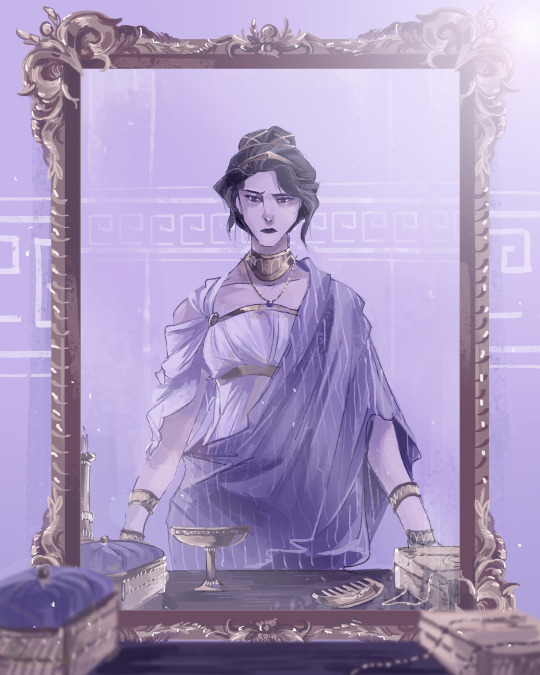
Waiting...
#i use her as an excuse to draw some nice ancient greece dresses#also she's pretty and i just like drawing her in general#penelope#penelope odyssey#odyssey#odysseus#epic the troy saga#epic the cyclops saga#epic troy saga#epic: the musical#epic the musical
3K notes
·
View notes
Text
When he heard the death rattle, Gilgamesh moaned like a dove. His face grew dark. "Beloved, wait, don't leave me. Dearest of men, don't die, don't let them take you from me."
-Epic of Gilgamesh
682 notes
·
View notes
Text
Something that I get chills about is the fact that the oldest story told made by the oldest civilization opens with "In those days, in those distant days, in those ancient nights."
This confirms that there is a civilization older than the Sumerians that we have yet to find
Some people get existential dread from this
Me? I think it's fucking awesome it shows just how much of this world we have yet to discover and that is just fascinating
#the epic of gilgamesh#gilgamesh#enkidu#sumerian#ancient history#world history#history#ancient sumeria#sumeria#ancient times#ancient civilizations#bronze age#ancient literature#ancient legends#mesopotamia#ancient mesopotamia#akkadian#mythology#sumerian mythology#mesopotamian mythology#mesopotamian#ancient mystery#ancient myths#ancient mythology#ancient myth#ancient legend#ancient myths and legends#ancient past#epic of gilgamesh#ancient epic
812 notes
·
View notes
Text
I love Poseidon's voice in Epic. He sounds furious and ecstatic at the same time. He sounds feral, which fits so much his whole character in mythology. Poseidon was the creator of horses, the storm bringer, the earth shaker. He was meant to represent the wild, dangerous side of the ocean and nature. This is the god that gets innocent men killed at sea four times a week minimum. So him sounding wild makes a lot of sense.
Also with how he says "Odysseus of Ithaca!" he sounds like a sports commenter. 10/10.
412 notes
·
View notes
Text
Aeolus

I am the wind, twisting and turning
I give the fire enough to stay burning
#art#my art#digital art#fan art#digital drawing#artwork#digital#aeolus#epic the ocean saga#epic the musical fanart#epic: the musical#epic the musical#my sketch#sketch#greek myhtology#greek myths#greek myth#greek gods#ancient greek#ancient greece#the odyssey#odyssey#odysseus
1K notes
·
View notes
Text

Flood tablet/Epic of Gilgamesh, from the Library of Ashurbanipal, Assyrian, 7th century BC
from The British Museum
#history#antiquities#art#ancient history#ancient art#cuineiform#epic of gilgamesh#ancient mesopotamia#assyrian
986 notes
·
View notes